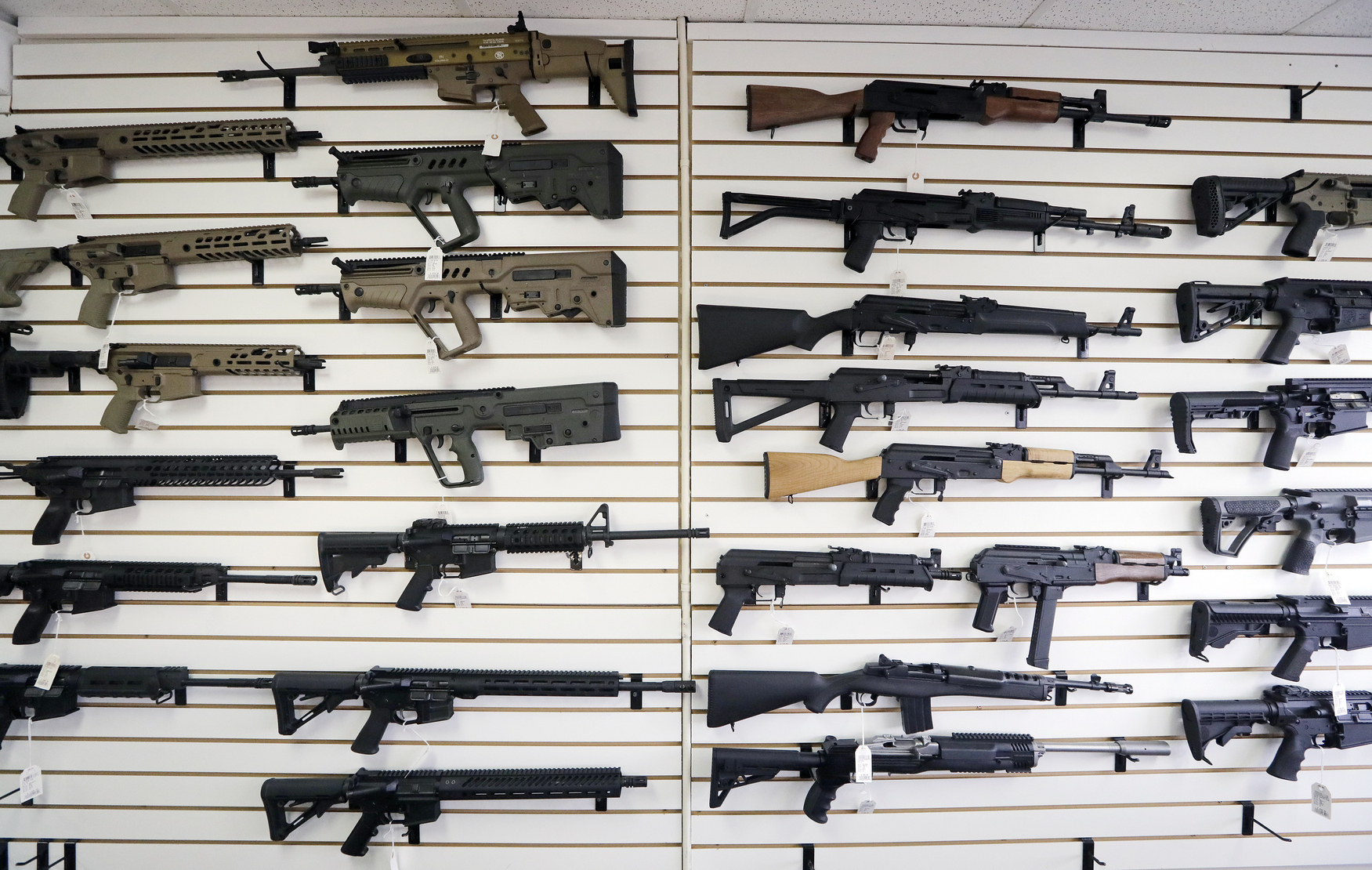The suspect in the shooting at a Boulder, Colorado, supermarket was convicted of assaulting a high school classmate but still got a gun. The man accused of opening fire on three massage businesses in the Atlanta area bought his gun just hours before the attack — no waiting required.
They are just the latest suspected U.S. mass shooters to obtain guns because of limited firearms laws, background check lapses or law enforcement’s failure to heed warnings of concerning behavior.
In the wake of the shootings, which together left 18 people dead, President Joe Biden renewed calls for stronger gun laws — including banning assault weapons and expanding background checks. Many Republicans oppose the measures, and the National Rifle Association blasted the discussions as a rush to “politicize this horrific situation.”
A look at how suspects in recent mass shootings obtained guns, based on police accounts, court documents and contemporaneous reporting:
BOULDER, COLORADO: MARCH 22, 2021. 10 DEAD.
Ahmad Al Aliwi Alissa bought a Ruger AR-556 pistol, an assault weapon with a 30-round capacity, on March 16, police said. Days earlier, a judge struck down an ordinance that banned assault rifles and high-capacity magazines in Boulder, citing a state law prohibiting local gun bans. A lawsuit challenging Boulder’s ordinances had the backing of the NRA, which said the ruling gave “law-abiding gun owners something to celebrate.” Alissa was prone to sudden rage and was convicted of misdemeanor assault and sentenced to probation for attacking a high school classmate, law enforcement officials and former associates said. It was not immediately known where Alissa purchased his gun or whether that incident came up on a background check. Had he been convicted of a felony, his purchase would’ve been barred under federal law. Alissa is charged with 10 counts of murder.
ATLANTA: MARCH 16, 2021. 8 DEAD
Robert Aaron Long purchased a 9 mm handgun just hours before going on a shooting rampage at three massage businesses in the Atlanta area, police said. A lawyer for the gun shop said it complies with federal background check laws. Georgia, like the majority of states, has no waiting period to obtain a gun. Long claimed to have a “sex addiction,” police said, and he spent time at an addiction recovery facility last year. Federal law bans guns for people who are “unlawful users of or addicted to a controlled substance” or who’ve been court ordered to a mental health or substance abuse treatment facility, but doesn’t mention treatment for other compulsions as a barrier to ownership. Long is charged with eight counts of murder.
MIDLAND, TEXAS, AUG. 31, 2019. 7 DEAD.
Seth Aaron Ator purchased an AR-style rifle through a private sale, allowing him to evade a federal background check, and fired it indiscriminately from his car into passing vehicles and shopping plazas. He also hijacked a mail truck, killing the driver. Ator had been blocked from getting a gun in 2014 after his background check was flagged because a court determined he was mentally ill, according to a law enforcement official familiar with the matter. Private sales, which account for up to 40 percent of all gun sales according to some estimates, are not subject to a federal background check and private sellers aren’t required to determine if a buyer is eligible to own a gun. Ator was killed by police.
DAYTON, OHIO: AUG. 4, 2019. 9 DEAD.
Connor Betts’ classmates said he was suspended in high school for compiling a “hit list” and a “rape list,” but authorities said there was nothing in his background that prevented him from purchasing the AR-15-style pistol used in the shooting at Ned Peppers Bar. Ohio law requires that sealed records of any juvenile crimes be expunged either after five years or once the offender turns 23. Betts, who was 24 at the time of the shooting, bought the gun online from a Texas dealer. It was then shipped to a Dayton-area firearms dealer, in accordance with federal law. Betts was killed by police.
EL PASO, TEXAS, AUG. 3, 2019. 23 DEAD.
Patrick Crusius bought an AK-47-style rifle and 1,000 rounds of hollow-point ammunition online 45 days before the Walmart attack, prosecutors said. A Crusius family lawyer said his mother raised concerns about the purchase in a call to police on June 27. Police said she asked if Crusius, who was 21 at the time, was old enough to buy a gun. Police said she was assured he was and that he’d qualify if he passed a background check. Police said she expressed concern only about his safety and said she’d seen no recent change in his behavior. Texas does not have the kind of “red flag law” that in other states allows courts to take guns from people posing immediate danger. Crusius posted a racist screed online just before the attack and appeared to target Mexicans. He’s charged with capital murder in Texas and federal hate crimes and firearms offenses.
VIRGINIA BEACH, VIRGINIA: MAY 31, 2019. 12 DEAD.
Former Virginia Beach city employee DeWayne Craddock legally purchased six firearms in the three years before he opened fire on a municipal building, including the two .45-caliber pistols used in the attack. An independent review of the shooting, commissioned by the City of Virginia Beach, found that Craddock displayed no warning signs or “prohibited behaviors associated with a pathway to violence,” and that he had no known history of mental health treatment. Craddock was killed by police.
THOUSAND OAKS, CALIFORNIA: NOV. 7, 2018. 12 DEAD.
Ian David Long, a former Marine machine gunner who served in Afghanistan, used a legally purchased .45-caliber pistol with an extended magazine in the shooting at the Borderline Bar & Grill. California tried to outlaw high-capacity magazines, but a federal judge reversed that after a pro-gun group sued. Months before the shooting, sheriff’s deputies called to Long’s home found him acting irrationally, but a mental health specialist didn’t feel he needed to be involuntarily committed. California has a “red flag law,” but there’s no indication authorities sought a court order to take away Long’s guns. Long killed himself.
PITTSBURGH: OCT. 27, 2018. 11 DEAD.
Robert Gregory Bowers had a carry license and legally owned the Colt AR-15 SP1 and three Glock .357 handguns police said he used to kill worshipers at Tree of Life synagogue. Bowers spent months posting angry rants against Jews on Gab, a social media site favored by right-wing extremists. He also posted photos of his “glock family.” Just before the attack, he posted a screed against a Jewish organization that resettles refugees, saying: “I can’t sit by and watch my people get slaughtered. Screw your optics, I’m going in.” None of the rhetoric appeared to raise red flags. His case is pending.
SANTA FE, TEXAS: MAY. 18, 2018. 10 DEAD.
Dimitrios Pagourtzis, a 17-year-old student, used a shotgun and a .38-caliber handgun that his father purchased legally and stored in a closet at their home, authorities said. It wasn’t clear if his father knew he’d taken the guns. Prior to the attack, Pagourtzis posted a photo on social media of a T-shirt with the phrase “Born to Kill” and had writings indicating he planned to attack his high school. A judge sent him to a mental health facility after ruling he was incompetent to stand trial.
PARKLAND, FLORIDA: FEB. 14, 2018. 17 DEAD.
Nikolas Cruz legally purchased a Smith & Wesson M&P 15 rifle in February 2017 from a licensed dealer a few miles from Marjory Stoneman Douglas High School, authorities said. He’d been treated at a mental health clinic but hadn’t been there in more than a year. Federal law prohibits gun purchases if a court declares a person a “mental defective” or commits them to an institution, but not if the person seeks treatment voluntarily. Federal law allows people as young as 18 to buy semi-automatic weapons. Cruz was 19 at the time of the shooting. His trial has been delayed by the coronavirus pandemic.
SUTHERLAND SPRINGS, TEXAS: NOV. 5, 2017. 25 DEAD.
Devin Patrick Kelley’s history of domestic abuse barred him from buying guns. He was able to because information about his crimes was never entered into a federal database used for background checks. The Air Force failed to follow rules requiring that it inform the FBI about his conduct. Kelley purchased four guns, including an AR-15-style rifle found at First Baptist Church, from licensed Texas and Colorado dealers over a four-year span. Kelley killed himself.
LAS VEGAS: OCT. 1, 2017. 58 DEAD.
Stephen Paddock purchased 33 of the 49 weapons found in his hotel room and at his homes in the year before he opened fire on a country music festival. Paddock passed all background checks. His gradual accumulation of guns went undetected because federal law doesn’t require licensed gun dealers to alert the government about rifle purchases. Paddock killed himself.
ORLANDO, FLORIDA: JUNE 12, 2016. 49 DEAD.
Omar Mateen purchased an AR-15-style rifle, a Sig Sauer MCX, and a handgun from a licensed dealer on separate days about a week before the Pulse nightclub attack. He passed a background check and had a security license that allowed him to be armed while on duty. The FBI investigated Mateen in 2013 and 2014 over co-workers’ concerns that he’d spoken about ties to terror groups. Neither inquiry led to charges. Even if he’d been placed on a terrorism watch list, Congress in 2015 rejected attempts to prevent people on the list from purchasing guns. Mateen was killed by police.
SAN BERNARDINO, CALIFORNIA: DEC. 2, 2015. 14 DEAD.
Syed Farook and his wife, Tashfeen Malik, used weapons the FBI said his neighbor, Enrique Marquez, legally purchased from a licensed dealer in 2011 and 2012. Marquez pleaded guilty to charges he conspired to provide support to terrorists and made false statements to acquire a firearm. He told investigators Farook asked him to buy the weapons because he would draw less attention. Farook and Malik were killed by police.
ROSEBURG, OREGON: OCT. 1, 2015. 10 DEAD.
Christopher Harper-Mercer and his family members legally purchased the handguns and rifle used in the Umpqua Community College shooting from a licensed dealer. Investigators found six guns at the college and eight at an apartment. Neighbors said Harper-Mercer and his mother went target shooting together. Harper-Mercer killed himself after he was wounded by police.
CHARLESTON, SOUTH CAROLINA: JUNE 17, 2015. 9 DEAD.
A drug arrest should’ve prevented Dylann Roof from purchasing the pistol he used at Emanuel AME Church, but a record-keeping error and background check delay enabled the transaction to go through. The FBI said a background check examiner never saw the arrest report because the wrong arresting agency was listed in state criminal history records. After three days, the gun dealer was legally permitted to complete the transaction. He was convicted and is on federal death row.
WASHINGTON, D.C.: SEPT. 16, 2013. 12 DEAD.
Aaron Alexis, a former reservist turned civilian contractor, passed background checks and legally purchased the shotgun used in the Washington Navy Yard shooting despite recent mental health treatment and a history of violent outbursts. He previously fired a gun in anger twice but wasn’t prosecuted in either case. Alexis was killed by police.
NEWTOWN, CONNECTICUT: DEC. 14, 2012. 26 DEAD.
Adam Lanza used his mother’s weapons, including a .223-caliber semi-automatic rifle, in the massacre at Sandy Hook Elementary School. Lanza’s mother, whom he fatally shot before going to the school, also purchased the ammunition. Lanza killed himself.
AURORA, COLORADO: JULY 20, 2012. 12 DEAD.
James Holmes was receiving psychiatric treatment when he passed required federal background checks and legally purchased the weapons he used in his movie theater assault. As in the Parkland and Navy Yard cases, treatment alone did not prevent him from buying guns. He was convicted and sentenced to 12 life terms and thousands of years in prison.









